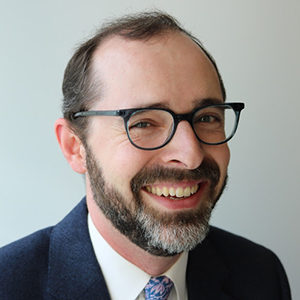The Council on Library and Information Resources (CLIR) is pleased to introduce the team of researchers who will conduct a study of the implementation of Digitizing Hidden Special Collections and Archives: Amplifying Unheard Voices. Their work has been funded by The Andrew W. Mellon Foundation as part of the recent renewal supporting the program’s evolution. The researchers will work closely with Joy Banks, CLIR program officer, as well as the program’s independent review panel and applicants throughout the 2021–2022 application process.
The results of this assessment will inform possible future iterations of the program and result in a public report in 2022.
Jesse Johnston
Jesse Johnston is a librarian and archivist, educator, and researcher with extensive experience in the public sector and academia. He previously served as the associate director for information  strategy at Mcubed, an initiative that promoted innovative research collaborations through the University of Michigan Office of Research, where he worked to catalyze projects in the arts and humanities across the university. He worked as senior digital librarian at the Library of Congress, where he led a project to document and publish digital preservation practices and policies, and as an archivist at the Smithsonian Center for Folklife and Cultural Heritage, where he worked on metadata and digital description for archival audio collections. Johnston also has a background in grantmaking, having worked at the National Endowment for the Humanities (NEH). He worked with many types of cultural heritage organizations while a program officer for preservation and access at NEH, and he also shaped and developed Common Heritage, NEH’s first and only program to directly support community archiving initiatives. In addition to this professional service, he has taught courses in information science and musicology at the University of Maryland, George Mason University, Bowling Green State University, and the University of Michigan–Dearborn. Johnston’s academic background is in ethnomusicology, a field that takes a social and anthropological approach to the study of music, and while working in this discipline, he undertook archival and ethnographic research in the Czech Republic.
strategy at Mcubed, an initiative that promoted innovative research collaborations through the University of Michigan Office of Research, where he worked to catalyze projects in the arts and humanities across the university. He worked as senior digital librarian at the Library of Congress, where he led a project to document and publish digital preservation practices and policies, and as an archivist at the Smithsonian Center for Folklife and Cultural Heritage, where he worked on metadata and digital description for archival audio collections. Johnston also has a background in grantmaking, having worked at the National Endowment for the Humanities (NEH). He worked with many types of cultural heritage organizations while a program officer for preservation and access at NEH, and he also shaped and developed Common Heritage, NEH’s first and only program to directly support community archiving initiatives. In addition to this professional service, he has taught courses in information science and musicology at the University of Maryland, George Mason University, Bowling Green State University, and the University of Michigan–Dearborn. Johnston’s academic background is in ethnomusicology, a field that takes a social and anthropological approach to the study of music, and while working in this discipline, he undertook archival and ethnographic research in the Czech Republic.
Ricardo “Ricky” Punzalan
Ricardo “Ricky” Punzalan is a scholar of archives and digital curation. He serves as an associate professor of information and steering committee member of the Museum Studies Program at the  University of Michigan. He studies the access and use of digitized anthropological archives and ethnographic data on academic and Indigenous researchers. He believes that archives and legacy research data must not only advance academic research, but also contribute to the well-being of communities. He is currently leading a series of conversations that engage Philippine studies scholars, archivists, cultural heritage workers, activists, and members of the Filipino community in Michigan to develop improved and reparative approaches to the collections of materials, including archives and varied cultural items, that American institutions acquired over the course of the United States’ colonial rule in the Philippines. Punzalan’s research has had the greatest impact in the area of virtual reunification and digital repatriation of cultural heritage collections. This research brought to the fore a critical challenge faced by underserved and Indigenous communities and created dialogs between communities and cultural institutions. To do this work, he designs and carries out community-based, participatory research projects that incorporate the perspectives of cultural heritage stakeholders beyond academic researchers. He is currently a research associate at the Smithsonian’s National Anthropological Archives and Council member of the Society of American Archivists.
University of Michigan. He studies the access and use of digitized anthropological archives and ethnographic data on academic and Indigenous researchers. He believes that archives and legacy research data must not only advance academic research, but also contribute to the well-being of communities. He is currently leading a series of conversations that engage Philippine studies scholars, archivists, cultural heritage workers, activists, and members of the Filipino community in Michigan to develop improved and reparative approaches to the collections of materials, including archives and varied cultural items, that American institutions acquired over the course of the United States’ colonial rule in the Philippines. Punzalan’s research has had the greatest impact in the area of virtual reunification and digital repatriation of cultural heritage collections. This research brought to the fore a critical challenge faced by underserved and Indigenous communities and created dialogs between communities and cultural institutions. To do this work, he designs and carries out community-based, participatory research projects that incorporate the perspectives of cultural heritage stakeholders beyond academic researchers. He is currently a research associate at the Smithsonian’s National Anthropological Archives and Council member of the Society of American Archivists.
Together, this team will draw on their expertise in digital archives, community-based research, and grantmaking to help CLIR create more inclusive, equitable, and broadly accessible regranting initiatives that serve a diverse range of applicant organizations. Over the next year, they will conduct surveys and interviews with individuals engaged with various aspects of Digitizing Hidden Collections. They also welcome feedback by email from anyone involved with the program; comments can be sent to dhc.auv.assessment@gmail.com.
The initial application phase of Digitizing Hidden Collections is now closed, and applicants will be informed of the review panel decision by July 30, 2021. For more information on the program, visit https://www.clir.org/hiddencollections/.

